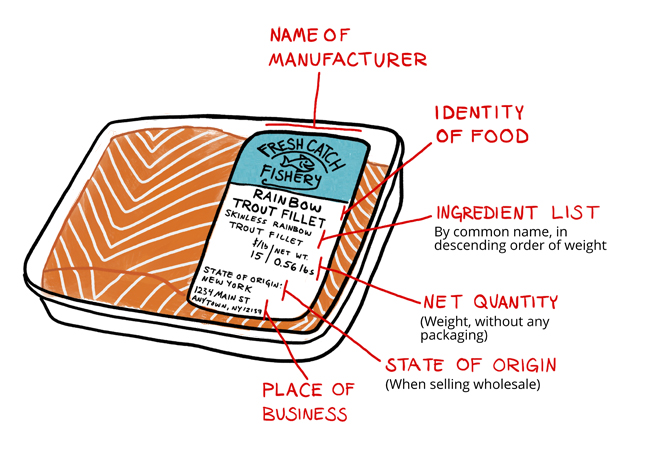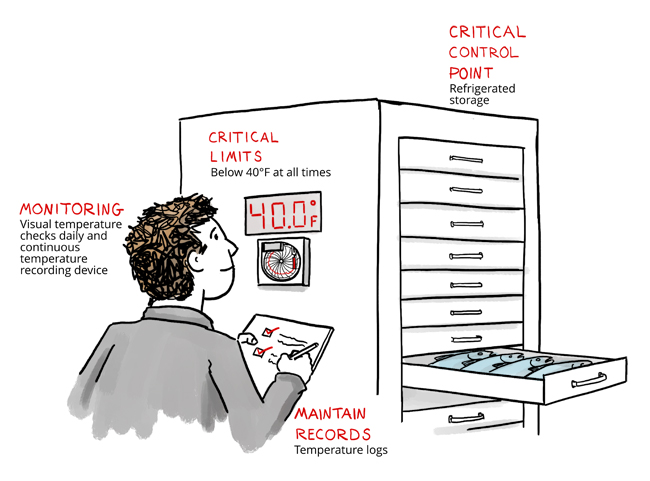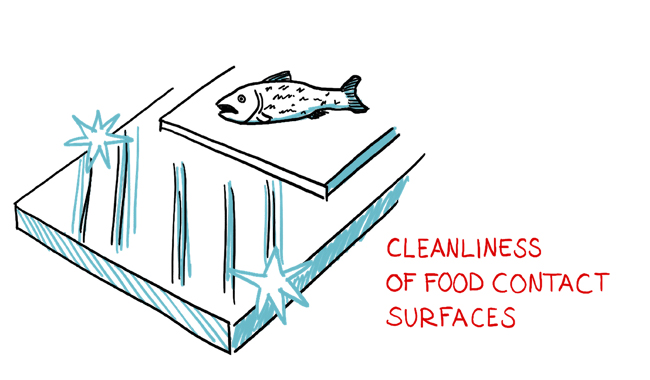
Clear food labels help consumers know what they’re getting. Credit: Georg Pedersen
— By Chris Gonzales, Freelance Science Writer, New York Sea Grant
Contact:
Michael Ciaramella, Seafood Specialist, NYSG, E: mc2544@cornell.edu, P: (631) 632-8730
Stony Brook, NY, June 7, 2021 - Since the start of the COVID-19 pandemic, rapid changes have been underway in the seafood industry. As restaurants and food service venues have remained shuttered, suppliers have been scrambling to market seafood direct to consumers.
On the one hand, these disruptions have created a business opportunity. On the other hand, they have required entrepreneurs to develop a clear understanding of regulatory requirements.
However complex the regulations may seem at first, new guides are helping people who are getting started in seafood sales and marketing sort out the key details.
The guides, developed with New York fishermen and aquaculturists in mind, help seafood marketers envision opening up new markets for seafood and seafood products. The guides were developed by a team led by Mike Ciaramella, a seafood safety and technology specialist with New York Sea Grant.

Monitoring storage temperatures is a staple of food safety. Credit: Georg Pedersen
Under Ciaramella’s guidance, the Seafood Processing and Marketing Task Force authored the guides. The task force is comprised of industry, academic, and government partners representing the fisheries and aquaculture industries.
“The task force was initiated to explore a variety of existing alternative marketing strategies and to highlight ways New York producers could effectively access new markets for their seafood,” said Ciaramella.
Experts expect these changes may continue to play out after the pandemic.
The guides were developed to help producers navigate the regulatory framework and different avenues of sale for seafood in New York.
As an added bonus, the guides consolidate many regulatory details in one place.
The seafood industry is rapidly adjusting to the pandemic, and post-pandemic, economy.

It’s important to keep surfaces clean. Credit: Georg Pedersen
Some sample topics covered in the guides:
• New York Food Labeling Requirements: In New York State, pre-packaged seafood must be labeled in accordance with federal and state labeling laws. This guide summarizes key details of those laws.
• Seafood HACCP: The government requires seafood handlers to use a preventative food safety plan known as HACCP. It stands for Hazard Analysis and Critical Control Points.
• Sanitation: Sanitation is an important component of any food safety program.
• Marketing Seafood: Marketing directly to consumers can be challenging, but rewarding, once you know the risks and benefits.
“We worked with partners to develop a series of guides outlining the regulatory requirements and best practices for processing and marketing seafood for different avenues of sale in New York,” said Ciaramella.
The guides are available on the web: www.nyseagrant.org/seafoodguides.
The project is supported by partnerships between New York Sea Grant and: Empire State Development, New York City Department of Planning, New York City Department of Transportation, New York State Department of Agriculture and Markets, New York State Department of Environmental Conservation, Nassau County Department of Health, Suffolk County Department of Economic Development and Planning, Suffolk County Department of Health Services, Suffolk County Weights and Measures, U.S. Food and Drug Administration, Blue Moon Fish, Cornell Cooperative Extension Suffolk County, Hudson Valley Fisheries, Long Island Commercial Fishing Association, New York Sea Grant, SUNY Morrisville, and Upward Farms.
Efforts were funded through the National Sea Grant Office COVID-19 Rapid Response grant.
More Info: New York Sea Grant
New York Sea Grant (NYSG), a cooperative program of Cornell University
and the State University of New York (SUNY), is one of 34 university-based
programs under the National Oceanic and Atmospheric Administration’s
National Sea Grant College Program.
Since 1971, NYSG has represented a statewide network of integrated
research, education and extension services promoting coastal community
economic vitality, environmental sustainability and citizen awareness
and understanding about the State’s marine and Great Lakes resources.
Through NYSG’s efforts, the combined talents of university scientists
and extension specialists help develop and transfer science-based
information to many coastal user groups—businesses and industries,
federal, state and local government decision-makers and agency managers,
educators, the media and the interested public.
The program maintains Great Lakes offices at Cornell University, SUNY
Buffalo, SUNY Oswego and the Wayne County Cooperative Extension office
in Newark. In the State's marine waters, NYSG has offices at Stony Brook
University in Long Island, Brooklyn College and Cornell Cooperative
Extension in NYC and Kingston in the Hudson Valley.
For updates on Sea Grant activities: www.nyseagrant.org has RSS, Facebook, Twitter, Instagram, and YouTube links. NYSG offers a free e-list sign up via www.nyseagrant.org/nycoastlines for its flagship publication, NY Coastlines/Currents, which is published quarterly.